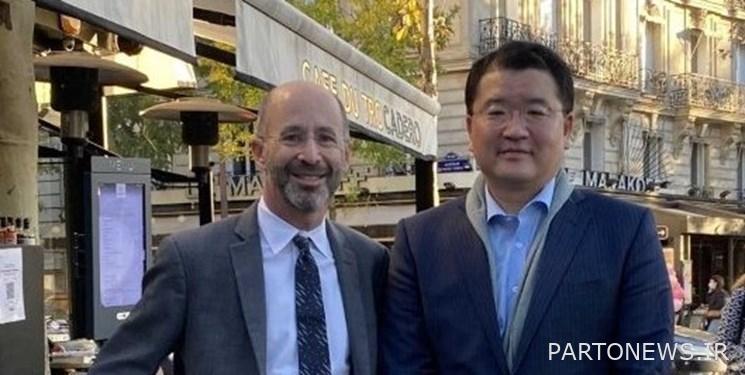Burjami met with Robert Mali and South Korea’s Deputy Foreign Minister

Robert Mali, the US government’s special envoy for Iran, met with South Korean Deputy Foreign Minister Choi Jong-kan on Monday, according to Fars News Agency’s International Group.
“I met with Korean Deputy Foreign Minister Choi Jong-kan in Paris,” Mali wrote in a Twitter message. “We discussed our countries’ efforts to resume the Borjami talks in Vienna and revive the nuclear deal.”
“Seoul is providing significant and active diplomatic assistance in resuming the UN Security Council talks in Vienna and maintaining relations with Tehran,” the South Korean Deputy Foreign Minister wrote in a Twitter message.
Last week, the Korean official announced that he had consulted with Ali Bagheri Kani, Iran’s deputy foreign minister. “Mr. Bagheri Kani and I had honest discussions about the importance of Tehran-Seoul relations and emphasized the joint efforts to preserve these historic relations,” he wrote in a Twitter message.
Relations between Iran and South Korea have fluctuated significantly over the years over the non-release of Iranian blocked funds in Korean banks and Seoul’s compliance with US sanctions against the Iranian people.
“We and the Republic of Korea (South Korea) agree on facilitating a joint return to the Comprehensive Joint Action Plan (CJAP) commitments,” State Department spokesman Ned Price said earlier. On the issue you have mentioned, we appreciate the resolute implementation of the current sanctions by the Republic of Korea. “These sanctions will last until they return to their obligations.”
In 2015, Iran reached an agreement with the so-called P5 + 1 countries to resolve tensions over its nuclear program. Despite the International Atomic Energy Agency’s acknowledgment of Iran’s adherence to all of its obligations, the US government unilaterally withdrew from the agreement in May 2016.
The US government has imposed sanctions under various pretexts in line with its hostile goals against the Islamic Republic of Iran and the advancement of the economic war against this country. Washington requires US companies and companies based in third countries to comply with the sanctions.
Despite admitting the failure of the policy of maximum pressure against Iran, the Biden administration has refused to take the measures necessary to return to the UN Security Council and has practically put the pursuit of Trump’s policy against Iran on the agenda.
Biden and his advisers have said they intend to bring the United States back to Burjam, but want to use the return to Burjam as a “platform to make the agreement stronger and longer.”
The Islamic Republic of Iran has emphasized that, given that the United States has been a party to the agreement, it is Washington that must return to the agreement by lifting sanctions, and that the fulfillment of US obligations needs to be verified. Tehran, of course, has emphasized that it is not in a hurry to get the United States back to the agreement.
After his trip to the West Asian region, Robert Mali left for the European capitals to discuss the stalled Borjam talks.
Robert Mali will consult with senior French, German and British diplomats in Paris on Friday to suspend nuclear talks with Iran.
Mali and Daniel Benjamin, the US State Department’s top Gulf official, began a tour of Abu Dhabi four days ago and met with a number of senior Emirati officials. Meeting with Iraqi Foreign Minister Fouad Hussein was part of their agenda.
The US delegation then traveled to Doha, the capital of Qatar, where they met with the Qatari foreign minister, who had met with his Iranian counterpart the day before.
They then traveled to Saudi Arabia. In Riyadh, US officials discussed Iran’s nuclear program and regional activities. Mali then had a telephone conversation with the Bahraini foreign minister.
End of message /
You can edit this post
Suggest this for the front page
.

